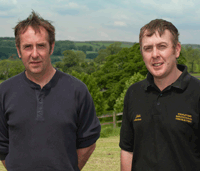FW Awards 2009: Contractor of the Year finalists – Andrew and Michael Stapleton

Triumphing in the face of adversity is what makes Andrew and Michael Stapleton’s contracting business thrive and Andrew’s motto of carpe diem (seize the day) typifies how their business is run.
When Andrew left school at 16 in 1987, there wasn’t enough work on the family dairy farm for him to join his brother Michael, so he looked for alternatives and ended up working for a neighbouring farmer and builder.
But, in 1988, when a local farmer phoned up to say his contractor had let him down, the brothers spotted an opportunity, and used their John Deere 3130 and trailed forager to do the 26ha (65 acres) of silage themselves. Soon after, a local contractor went out of business and the brothers visited each of the customers to ask if they could take the work on and the silage round started to grow.
In 1994, the first umbilical system had come on the market, and Andrew recognised this as a way of providing work throughout the winter. “We were soon travelling throughout the Dales to spread, as there was noone doing it at the time, and our turnover soon doubled.”
But in 2001, disaster struck twofold. Not only did foot-and-mouth decimate the Dales landscape, with 90% of their customers going out of farming overnight, but Andrew and Michael’s father, William, tragically passed away from a brain tumour.
“Overnight, we’d lost nearly all of our customers,” Andrew says. It took some getting over, but, having got the DEFRA contract to empty all the slurry pits, they started on the long road of building up the business once again.
Twenty years on, the Stapletons now harvest 3250ha (8000 acres) with two John Deere self-propelled foragers as well as ploughing, baling and landscape work. Three umbilical slurry systems spread up to 30m gallons of slurry a year, and they also offer shallow slurry injecting and muckspreading. All this, alongside running a dairy herd of 180 Friesian Holsteins and a beef unit of 200 head.
Because they’re in a particularly wet area, the Stapletons have had to up capacity to be able to deal with an extremely short operating window, and they can now cut up to 162ha (400 acres) a day using two sets of triple mowers with one trailed machine knocking down the outside rows.
Two John Deere foragers, a 7400 and a 7700 series, head up the two silaging teams and they can clear up to 5t/min if needs must.
Andrew believes that through improving efficiency and investing in new technology, the business will develop. They’re testing a pre-production mapping system on the John Deere forager, as well as giving customers silage analysis and printouts on farm.
Testament to the way the six full-time staff are treated is the fact that most have worked for the brothers for longer than five years. “It’s important we offer them training and work throughout the winter to aid both their and the business’s development,” says Andrew.
They offer nitrate testing and field mapping to all customers alongside slurry spreading, and have trialled GPS on the triple mower rigs. Wherever possible, cultural controls rather than agrochemicals are used to control pests, and the brothers avoid growing whole-crop silage next to watercourses to avoid leaching.
It’s not just a simple contracting service the Stapletons provide. Andrew hands out every bill by hand, no matter how large or small, along with a farm-reared Turkey.Any one day can see him being a friend, silage broker, fabricator or and adviser. “Some days you can find your time being taken up helping people along, but that’s what it’s all about.”
Farm facts:
- Work undertaken: 3250 ha (8000 acres) grass, whole-crop and maize silage, umbilical slurry spreading, muck spreading, lagoon stirring, drainage, landscaping,
- Machinery fleet: Tractors – JD 7530, 7430, 6030, 7820, 3 x 6920, 6620, 6610. TwoJCB 416 loading shovels, JD 7400 and 7700 Forage Harvester, two JD triple mowers, three umbilical cord machines, three x muckspreaders, Hitachi 360 digger
- Labour: Andrew and Michael plus six full-time staff and up to 20 in peak season.
What the judges liked:
- Integrated the farm and contracting to make best use of labour
- Make the best of the opportunities that are available
- Provider of year-round labour for local community
- Environmentally aware and astute
- Keen to adopt new technology
- More on the Farmers Weekly Awards 2009
- Meet the finalists

